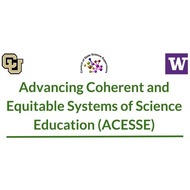
(View Complete Item Description)
The NRC Framework for K-12 Science Education and the resulting Next Generation Science Standards focus on an integrated three-dimensional view of science learning in which students develop understanding of core ideas of science and crosscutting concepts in the context of engaging in science and engineering practices.How is assessing three-dimensional science learning different than how we have thought of science learning in the past? How can we design assessment tasks that elicit student’s current understanding of specific aspects of the disciplinary core ideas, science and engineering practices, and crosscutting concepts in order to shape future instruction? In this workshop, participants will learn how to interpret and design cognitive formative assessment to fit a three-dimensional view of learning.This resource originates from a series of PD sessions on 3D formative assessment developed and provided by Katie Van Horne, Shelley Stromholt, Bill Penuel, and Philip Bell. It has been improved through a collaboration in the ACESSE project with science education experts from 13 states. Please cite this resource as follows:Stromholt, S., Van Horne, K., Bell, P., Penuel, W. R., Neill, T. & Shaw, S. (2017). How to Assess Three-Dimensional Learning in Your Classroom: Building Assessment Tasks that Work. [OER Professional Development Session from the ACESSE Project] Retrieved from http://stemteachingtools.org/pd/SessionB
Material Type:
Module
Authors:
Sarah Evans,
Philip Bell,
Shelley Stromholt,
Katie Van Horne,
WILLIAM PENUEL,
Sam Shaw,
Tiffany Neill,
Abby Rhinehart









